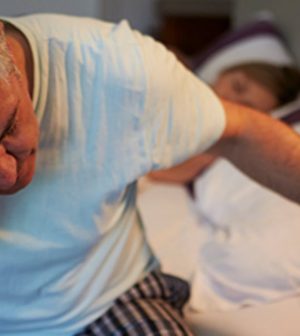- Could Your Grocery Store Meat Be Causing Recurring UTIs?
- Are You Making This Expensive Thermostat Error This Winter?
- Recognizing the Signs of Hypothyroidism
- 10 Strategies to Overcome Insomnia
- Could Artificial Sweeteners Be Aging the Brain Faster?
- Techniques for Soothing Your Nervous System
- Does the Water in Your House Smell Funny? Here’s Why
- Can a Daily Dose of Apple Cider Vinegar Actually Aid Weight Loss?
- 6 Health Beverages That Can Actually Spike Your Blood Sugar
- Treatment Options for Social Anxiety Disorder
About 1 in 8 Americans Has Been Diagnosed With Chronic Insomnia

Millions of Americans struggle to fall or stay asleep, a new survey finds.
Some struggle more mightily than others: Roughly 12% of Americans polled said they have been diagnosed with chronic insomnia, the American Academy of Sleep Medicine (AASM) survey revealed.
Who was the most likely to miss out on good sleep? Men (13%) were slightly more likely than women (11%) to have been diagnosed with chronic insomnia. Meanwhile, millennials reported the highest rate of chronic insomnia diagnosis (15%).
How debilitating can insomnia be? Symptoms associated with insomnia include daytime fatigue or sleepiness; feeling dissatisfied with sleep; having trouble concentrating; feeling depressed, anxious or irritable; and having low motivation or low energy.
“Chronic insomnia impacts not just how a person sleeps at night, but also how they feel and function during the daytime,” said AASM President Dr. Eric Olson. “Fortunately, there are effective treatment options for those who are living with chronic insomnia, and these treatments can significantly improve both health and quality of life.”
Chronic insomnia can impair physical, mental and emotional health, and it can lead to increased risks for depression, anxiety, substance abuse, motor vehicle accidents, Alzheimer’s disease and type 2 diabetes, experts say.
The most effective treatment for chronic insomnia is cognitive behavioral therapy, which combines behavioral strategies such as setting a consistent sleep schedule and getting out of bed when you are struggling to sleep, with thinking strategies, such as replacing fears about sleeplessness with more helpful expectations. While six to eight sessions are typical for treating insomnia, some patients improve more quickly.
“Cognitive behavioral therapy offers patients who are experiencing chronic insomnia a highly personalized plan to help identify any underlying problems and provide long-term solutions that promote healthy sleep,” said Michael Nadorff, president of the Society of Behavioral Sleep Medicine.
If you have trouble falling asleep or staying asleep, tell your doctor. Your doctor may refer you to a therapist or an AASM-accredited sleep center for help.
The survey of 2,006 adults throughout the United States was conducted online from May 16-24. The margin of error is plus or minus 2 percentage points.
More information
The Sleep Foundation has more on insomnia.
SOURCE: American Academy of Sleep Medicine, news release, June 20, 2024
Source: HealthDay
Copyright © 2026 HealthDay. All rights reserved.










